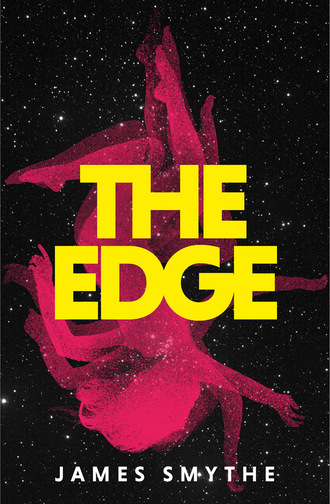
The Edge
From the other side of the mess hall, I hear Berry and Cohen and Gibson eating, talking. Cohen quiet, quieter than usual certainly; Berry and Gibson being dicks, their usual asshole selves. Not giving a shit about the noise they’re making, or how anybody else is feeling. Snipes died last night, and they don’t care.
I feel less about it than I should. Shock, I suppose; or, maybe, I just didn’t know him that well. Maybe it’s just not the sort of thing that sinks in too hard when you’re only a week – less – into knowing somebody.
Mon clocks me looking over at them, my side-glance.
‘Cohen?’
‘He hasn’t said anything. But he will, he’s a prick.’
‘That he is.’ Her hand creeps to mine. ‘He tried anything?’
‘No. No.’ I side-glance again: Berry laughing at some shitty joke Gibson’s made. Cohen quietly to one side of them, as if he’s overseeing the whole thing.
I really hate them.
The egg is disgusting. I nudge it to one side, but can’t face the rest of the meal anyway. My stomach turns. Being up here, it’s hard on every part of your body. The actual physical being here, it’s not normal. We are not meant to be here, that’s the crux. This isn’t natural, so why should our bodies accept it? ‘What’s today like for you, assuming we’re not just packing our bags? Cross fingers, let’s pray.’ My face grins, and I feel the muscles stretch. Tighten.
‘Well.’ She stretches her Ls, a cartoon drumroll. ‘Hyvönen broke his arm.’ I laugh at that, a spit of sound from my mouth, and she covers her mouth as she laughs as well. ‘No, no,’ she says, ‘he fell down, right after he saw the Anomaly, apparently. It wasn’t funny.’
‘It’s a little funny,’ I say.
‘He’s old.’
‘Too old to be up here,’ I say. ‘And he’s been up here too long.’
‘So bloody long,’ Mon says. ‘His bones are fragile as anything I’ve ever seen. Breathe on them too hard and they’ll turn to dust. So today I’ll have a fight on my hands. He’ll need injecting to seal it. Maybe nanites. He’s resistant, you know that.’
‘At least if he gets handsy you can snap him like a twig.’
‘God, twigs. Remember trees?’
‘Remember soil?’
‘Remember air?’
We laugh, both of us. A joke we make a lot. We’ve been up here together a couple of months, that’s all. Amazing how bonded you can become, in that time.
‘Are you scared?’ I ask her.
She nods. ‘I’m fucking petrified.’
‘What happens if it leaps again?’
‘It hasn’t before. Chances are it won’t again.’ She shrugs. ‘That’s a doctor’s opinion. It’s not a pattern until it happens twice.’
‘Jesus,’ I say, ‘you’re so nonchalant. How can you be this laid back?’
‘I have a relaxed disposition,’ she replies, ‘that’s what my lecturers always used to say. Makes for a good surgeon. It’ll be fine. We have to believe it. They’ll get us off this thing, take us down there.’
‘But it’s still coming,’ I say.
‘Yes,’ she replies, ‘it is.’ She stands up, her plate empty. ‘I should make a start, prep the room for Hyvönen’s op. If you need to talk, about Snipes, or anything …’ Her voice trails. I nod. I know, I know. ‘You okay if I leave you alone now?’ she asks, and I nod again, it’s fine.
But as she’s leaving, I ask her: ‘Do you think Snipes’ death had anything to do with this? With it … moving?
‘No,’ she says.
I watch her as she leaves, as she walks straight past the window, straight past the Anomaly. As it doesn’t seem to faze her; and I wish I was more like her, sometimes. Able to leave things; to move on.
I eat the muffin with my fingers because it’s impossible to cut with the ridiculous plastic knives we’re forced to use. As if there’s any need for anything sharper – anything that could be construed as a weapon – up here. If we wanted to mutiny, we’d mutiny. If we wanted to kill ourselves, we’d find a way.
I think of Snipes. I don’t not think of Snipes.
I should be more broken by it, I know, but grief is strange; and time here is stranger. It hasn’t hit me, I know. It won’t until I’m not here, probably. Until I’m somewhere else, and this is the past, and Snipes is the past as well.
He is the present, still, somehow; there, but not.
A buzz comes through, on my comm. An instruction sent to everybody, from Hyvönen; but written by Sian, his assistant. Her tone, her timbre. Clipped to the point of abrupt.
We are not to go outside any more. No suits, no walks, no unnecessary outings. Only if it’s mission critical will we be allowed. We have to seek permission.
Disappointing: because that suggests that there’s still a mission to be critical for.
Only when Hyvönen has something that he needs us all to do does he issue specific instructions.
So I leave. I stand in the hallway, and I stare at the darkness.
To think that we are suddenly so close to darkness, so close to death, to the unknowable. To chaos, and to disorder. To this thing that was so ambiguous for so very long, a something that existed millions and millions of miles away from us; and maybe for millions of years, maybe.
But now, it’s here.
We’ve seen it this close before, on fly-bys, through the drone footage that Desh and I worked out when we first got up here. I built the new drones from units meant to be flown on a tether, used for station maintenance. I had painted the fronts of them yellow, like little beaks; and so we christened them Huey, Dewey and Louie. From some old cartoon, or some old movie. Desh chose the names. He flashed their firmware with an update to their sound files, so that they quacked when they were given instructions. We got video as they approached the Anomaly, perfect clarity on its darkness.
Hyvönen was pleased, because he saw them as an opportunity. A way to send living subjects – mice, rats, a new generation’s Laika if he could lay his hands on it – into the Anomaly. Nothing had gone in and come back alive, and he wanted us to test the limits of the thing.
The mice died, of course. Hyvönen didn’t even seen disappointed. Instead, he told us to send more out there, so we did; watching them drift off into that deep, inky darkness, as matte and dull as anything you can imagine.
Before I came up here, I would lie in the garden with Theo, and we would watch the stars. He said, ‘There’s a hole in the sky,’ and I told him that it was not that simple. There was more to it than that. He asked what it was, then, and I said that it was an Anomaly. That is the only word that we have for it. Something that we cannot explain; beyond that word itself.
This was how I explained to him what it was that I did. I would say, I am helping to create something that will go into that thing, that will try to stop it. I’m writing code, like a language, to allow the ship we’re going to send in to work better.
He didn’t understand the words – oh my God, he was too young for the words, or the meanings behind them – but he liked looking at the stars with me. He liked when I drew the shapes of the constellations for him, and when I told him what they were. What they meant, if you believed in superstitions. But then there was that dark mass in the sky with nothing inside it, and nothing past it; and when he asked about it, I didn’t have answers for him.
I like explanations. I need them. I understand exactly how this place works. I understand the life support systems, the air filtration equipment, because it’s the same as the ones that I used to fit on SC3s, back on Earth. I understand the centrifuge, which we basically co-opted from the Russians. I was on the adaptation team, ensuring maximum efficiency, keeping our gravity as constant and consistent as possible. I understand how all of the station works, even if only on a theoretical level – there are parts I am not allowed to touch, aspects of the station that Desh or Cohen or Sian have control over, but I have still tried to understand them. Eventually, I am who people turn to in order to fix problems. Even if those problems are on a software level – some of the software here is cheap and nasty, hacked together, much to Desh’s chagrin – it’s easier to ask somebody to fix the hardware than the soft.
Eight of us up here; eight people who have so much resting on them.
And the pressure’s multiplied so quickly. Yesterday, we were years from the necessity of understanding it, or stopping it, or something. And now, today? Today, we’re days away, at best. The Anomaly is headed to Earth, it is coming, and we still understand so little about it.
I like to think, if the Anomaly manages to reach us, or them, however I think of it, that we will change the way that we live. We will adapt. When they can study it, maybe that’s when we work out how to counteract it, and stop it happening. I don’t know. We adapted to the heat, when it set in; to the seas, when they rose. We’ve adapted to the oxygen generators that blot the landscapes, to the ravaged ecosystems, to the cities we were forced to abandon in the wake of the microclimates we had no chance of controlling. We adapt every time some new virus gets unleashed, and we’re terrified about attacks for a few hours; and then some scientist somewhere makes an antidote and it’s released into the water supply and the air filters, the code for it copied the world over, protection immediate and widespread.
Until we know otherwise, we’re safe.
That’s what I tell myself, at least.
The donut is quiet. I don’t know what I want, really – do any of us? In a crisis, can any of us truly know what we want, need, even require? And if the Anomaly leaping towards us doesn’t constitute a crisis, what truly does? – but I don’t want silence. I want the buzz of people working. Mon is preparing for Hyvönen’s arm surgery. Desh is doing whatever coders do to pass their own concept of time. The clique are being assholes somewhere, I’m sure, passing time instead of actually doing work, even if we don’t quite know what work should look like right now.
I want a message. A joke: Hyvönen thinks of himself as a god, and I suspect that even he would admit it. Mon and I use that. Instructions like pennies from Hyvönen, a bad pun that we love, because it’s something.
But it’s so quiet. I stand alone at the window and I watch the darkness. This massive object that isn’t an object at all; a presence with no presence. The Anomaly: alien, impossible to comprehend. Something that we don’t understand, and that we never will. We never thought it could happen, that’s the insane thing. That’s the truth of every change in our lives: terror attacks and pandemics and personal tragedies, we try to keep them from ourselves until they’re relevant. If we stopped and contemplated our own ends too much, we would go insane.
Why don’t I like being out here? Part of me feels selfish, to think of the people who would murder for this opportunity. But they aren’t here, and they can’t see this. The Anomaly, looming, coming into focus; or we are, we are moving towards it. It has no orbit: it simply sits, taking up space.
Soon we’ll be past it, and it won’t be there to see any more, until we swing back around.
I put my hand to the glass, as if this is some romantic movie; a loved one on the other side of the glass, about to spiral out of control.
Snipes’ hand on the airlock window.
He wasn’t my loved one; he was barely mine at all.
The Anomaly: that is all I can see. Whatever is behind its wall, its border, that’s the loved one. The nothingness, I suppose.
The lights flicker. Cycle. Off, click, click, off one by one. The donut plunged into darkness. The thrumming of the centrifuge beneath my feet; the vibration of the station through the glass. We say that it’s still, it’s never still.
The station creaks.
Metal on metal; bolted together segments of every piece of this place, still settling.
A new house settles, they say. The floorboards settle, the roof settles, the windows settle. When Xavier and I moved, so I could be close to my training, the house was doing nothing but settling for so long.
‘Did you hear that?’ I would ask, and he would shake his head.
‘You would hear creaks in the twigs of newly built nests,’ he said.
But I heard settling: like footsteps, softly treading, feet that didn’t exist on floorboards that had been there for years; years that, for some reason, were not quite enough.
The creaking under me now, and from the windows. In the darkness, it feels as if it’s the walls closing in. Tighter, tighter; and the space is already small enough, even though I am not claustrophobic, and I am not afraid of the dark. Still: creaking, and then thumping—
And out of the window, a glance, and I see something staring at me, something—
My face. The lights flickering, and the reflection of my own face, against that dark mass. I stare at the reflection – back at the reflection – as it catches me off-guard. A moment, caught in it—
Something thumps into the glass. A hand, I think, fingers splayed, pressed to the window; not a reflection, but another me, out there, a device in a horror movie, to scare, to intimidate, to signal an ending—
But it’s not a hand, it’s detritus. Orbital debris. It’s a piece of clothing: a glove, floating out here. Accidentally flushed, or …
Or it’s Snipes’. His glove, drifting loose, free.
It sticks to the window briefly, then the sensors puff it away, as they’re designed to do. To keep the windows clean, and clear, and perfectly transparent.
I am afraid of being here, because everything now is about being afraid. The lights come on, one by one, around the donut; and I follow them, because it’s better there.
Even though it’s just as quiet, there’s somehow less silence.
2
Here is the story of humanity’s relationship with space, with the stars, with the Anomaly.
We began by staring up at the nothingness, at the twinkles in it, the light we could see, and we assumed that it was gods; that it was incomprehensible. Before we knew what the sun was, before we understood the concepts of stars and red dwarfs, we assumed deities and demons. We assumed that our mortality meant that this thing – a life giver, which aided crops, which gave us light before we could even do that for ourselves – was something more incredible than we could comprehend.
We worshipped it, and we were probably right to.
Eventually, of course, we told ourselves that we did not want to be complacent about our knowledge of what was above us. We began to fathom what it was, and how it worked. Maybe we lay there, counting stars, watching the brighter ones move around us. Trying to understand. That was before we started to destroy the sky, as well. Maybe it’s natural to wonder how clear the sky might have been, maybe; and if, with that crystal clarity, we could actually see everything. We came from millennia of not understanding this space above us, and then we charted it and plotted it and built telescopes, and suddenly we knew it all. We argued about our place in it, whether we rotated or were rotated around, depending on our arrogance; and we argued about what it would be like out in it, if we could breathe, if we could hear. We didn’t understand, and yet we told ourselves that we did.
We sent up satellites, probes, ships. We landed – first on the moon, then more recently on Mars – and we told ourselves that to do it once was a demonstration of humanity’s greatest skills: of exploring, yes; but underneath that, of course, was conquering, was might and majesty.
This is what we do. We move to where we are not.
Enter, then: the Anomaly. For so long lower case, until we didn’t have a better name for it. Something is anomalous until it isn’t; we have never defined it better. The Hyvönen Anomaly, technically, that’s how we designated it, after it started life as a number that meant nothing, a code, in research files and secret emails. But the Hyvönen Anomaly is likely how history will remember it. He tries to speak of it now with his name removed from the noun, to keep himself apart from it; as if it might sully his good name. It’s a piece of space that we cannot understand, that exists but only barely, dense and unreadable. It’s a semi-permeable membrane that, when crossed into, cannot be left.
Inside it, we know – and all we know – is death.
And it’s coming for us.
I feel a constant need to check the fixtures and fittings of the station, the smallest aspects that somehow hold it together. I spend much of the day on the windows, checking the sealant, to make sure that the creaking wasn’t important. Pressing my thumb to the edges of the glass, to feel for the cold. The way it works, the multiple layers of glass, it would get cold if there was a leak.
Colder, rather; it’s always cold.
From behind, I hear the low growl of Hyvönen’s resting voice: a constant hum, almost, from his throat, as if he is in a state of perpetual disagreement. He’s not built for being up here any more. He shuffles past me, accompanied by Sian. He doesn’t look at me; doesn’t look at the window, at the Anomaly. Arm tight in a sling. Doesn’t wait, just barges – as much as he can do such a thing – into the medical bay, one of the rooms off the donut, and the door shuts behind him.
The glass around the medical bay usually dims when there’s something going on inside it, but it hasn’t, not now, for some reason – probably Mon leaving it clear, knowing that I will want to see this. It’s evidence of his fallibility. I watch as Mon tweaks his arm, as she works with her machines to examine the fracture, to try and reset the bone. The pincers run up and around his limb, whirling, spinning, heating and cooling, fixing the bone with their gels and clays.
This version of him isn’t what they sold to us before we came up here. It’s not even close to how he’s presented to the world. The agency uses promotional photographs from thirty or so years ago, back when he still had his birthmark across his face; when that was what distinguished him from his brother. That was when the whole space programme was his, and he was a marvel. The man who brought back wonder to the masses. They kick-started a new space age, in theory: one that was less about discovery of our solar system, less about exploration, more about understanding. Exploration was how the Anomaly was found; investigation was how, in theory, we would understand it. The mission failed, the ship lost – just like every ship – but there was nobody else willing to step up. He kept his position, presenting himself as a costume-party fantasy of a bygone age’s space-race: thin-tie suit and slicked-back hair, horn-rimmed glasses and tumbler of whisky. He spoke to the world, a self-proclaimed genius, and he apologized.
This isn’t over, he said. I won’t stop until we understand what we are dealing with.
He didn’t stop, in fairness to him. Except, now, he’s his own greyed-out shadow. His hair thinned to the point of near non-existence, somehow both swept and pasted across his scalp. His bones deteriorating from age, from trip after trip up here during the construction phase, from the traumas he’s put them through; bones so damaged that his entire self is a patch-job, nanites in place of Band-Aids, tying him together. But his decay is more than just hips and ankles: dementia has set in. We all know it, even though it’s not public yet. He needs daily treatments. When we first came up here, Desh told me that there’s a MemoRain in Hyvönen’s office, that he’s on a regular regeneration cycle: his memories put back into his brain, slides inserted back into an antique projector after an accident, fingers crossed that the images are still tenable.
I have asked Mon, and she says that she can’t talk about his medical files. From the way she says it, I know that it’s true. But I get it: people are more inclined to question their leaders if they are known to be failing.
Once, Hyvönen had the keys to the kingdom, that’s the thing, and he sent up a ship, with his brother on it, and it went into the Anomaly. Of course, it never came back. That’s how these stories always end: you send something into the unknown, and it becomes the unknown itself. It was a loss that Hyvönen took ownership of; because he stayed, and his brother went.
Not that he shows his pain, of course. Nobody talks about the tragedy of the eternally lost Mirakel Hyvönen any more. It’s just not the done thing.
In the medical bay, Hyvönen – our Hyvönen, Tomas – barks at Mon as she slides the apparatus from his arm. Some part of it scratches his skin, and he snaps, in pain and rage, his ire aimed squarely at Mon. A scratch, little more, and it bleeds, yes, thick bright blood, but still; it’s only a scratch.
I watch as Sian tries to calm him. She puts her hand on his shoulder, and she apologizes on his behalf. I’m assuming it’s an apology, but it’s not like her face actually shows anything resembling emotion when she says it. She’s cold, emotionally, which I think probably makes her good at her job.
He’s a lot to deal with.
Mon unseals a large box in the corner, pulls out a canister. Nanites. I’ve seen them before, down on Earth, when one of the people in training was crushed under an old SC3 craft. It fell from its anchor at the back end, fin slamming into the guy’s leg, nearly taking it off. They put nanites onto the damage, and they sealed it, rebuilt it. Not permanent, but good enough to hold him until they could get him to a proper surgeon, until he could get a perfect reprint fitted.
Mon opens the canister, takes out a tranche of the nanites. They’re in small liquid pouches, sealed off and protected, kept in cold storage to prevent them activating. She draws some into a syringe and injects them into Hyvönen’s forearm. It’s blackened and bruised, the angle of the bone wrong; and he winces at the needle, at the pressure of the nanites entering his flesh. As soon as they hit the warmth of the body, they start to work. This would be miraculous, if miracles weren’t something we just invented ourselves, something we dreamed of and then made happen. Under his skin, the nanites slither, shimmering through like a light held beneath a bedsheet; and they find their target, and they mend it. They can fix almost anything, that’s the most astonishing thing about them. There’s a half-life, sure, before they stop being efficient, but if you need to patch a metaphorical tyre, they’re the ideal.
Hyvönen stands up. He adjusts himself, moves his arm; stiffly at first, and then with greater range of movement. The whole thing looks immediately better: the colour returning to normal, and the skin less loose, as if it’s been plucked and pulled back, stretched around his old bones. A nip and a tuck and he’s good as new; as old, rather.
He does this strange little bow, to Mon, and to the equipment, and then turns and leaves the room. He tries to stride his way out of his shuffling, leading to a juddering as if there are frames missing from my vision. Sian lets him through the door first. He carries himself as somebody twenty years older than he is. Held forward, stooped and crooked, and he glances from the corners of his wet eyes at everything and everybody. He sees me, standing by the window.
‘You,’ he says. Raises his hand; points. Confusion, as if he’s partway between recognizing me and not. This is par for the course with him. He is not all here, not all the time. Wait for the parsing. ‘What are you doing here?’
‘Sorry,’ I say, ‘I shouldn’t have been staring. I heard about your arm, sir.’ We treat him like military, even though he’s definitely not. His space station, his rules. ‘I hope it’s feeling better.’
‘You shouldn’t be here; what are you doing here?’ he asks, again.
‘We should go,’ Sian says, to both him and me. She leads him down the corridor, around the donut, away from the labs; and I am, again, alone.
Saying goodbye to Theo when I came up here was the hardest thing that I have ever done. Of course it was. Xavier didn’t even want to let me bring him to the launch, but I told him that it was important to me: that Theo see me leave, and understand absolutely that I was coming back. I spoke to Xavier’s mother, because we still had a perfectly reasonable relationship – I suspect, if pushed, she even agreed that her son was a poor example of a human being – and I told her what he was doing. I said, ‘I’m trying to do something to help us all, and Xavier is being a fucking child.’






